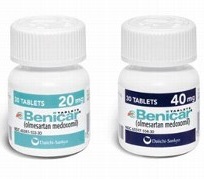The FDA finally wrapped up its review of Benicar safety. After four years of sifting data, the agency says it found "no clear evidence" that Daiichi Sankyo's blockbuster blood pressure drug increased the risk of heart attack. But the agency will require new safety-related data on Benicar's official label.

The FDA launched its review in 2010, after a Phase III trial in Type 2 diabetes patients raised a red flag. More patients in the Benicar (olmesartan) arm died from cardiovascular causes than placebo patients did. Complicating matters, Benicar patients suffered fewer non-fatal heart attacks. The agency dug into additional studies, including one large trial in Medicare patients, and ended up finding no clear increase in cardiovascular risks for diabetics taking Benicar.
"The collective evidence available at this time does not support changing our recommendations for olmesartan use and does not support recommending that its use be avoided in patients with diabetes," the FDA wrote in its safety review.
Olmesartan-containing products were prescribed to some 1.8 million patients in 2013, according to FDA statistics. Benicar is among the leading angiotensin receptor blockers, or ARBs, a category that includes Novartis' ($NVS) Diovan. While Benicar's sales dipped in 2012, it was still the fifth top-selling cardio drug that year.
Daiichi Sankyo also markets two olmesartan combo drugs: Azor, which marries olmesartan and the calcium channel blocker amlodipine; and Tribenzor, a three-drug combo with amlodipine and hydrochlorothiazide, a diuretic. Worldwide sales of Azor jumped to $291 million from $254 million from 2010 to 2011, while sales of Tribenzor soared to $101 million from $30 million in the same period, according to EvaluatePharma. But Benicar eclipsed both by far, with a peak of $2.6 billion in 2011. It brought in $2.4 billion for 2012.
Benicar, however, might not be in the clear yet. As CardioBrief's Larry Husten points out, while the FDA may not have turned up clear evidence of an increase in cardiac risks in diabetics, it also didn't turn up clear proof that it's safe. The Medicare study--the only one that broke out data on diabetics, CardioBrief says--had some safety signals, too. Benicar patients with diabetes had a higher risk of death than diabetic patients using other ARBs. In non-diabetics, the trend was reversed, with a lower risk of death for Benicar patients compared with those on other ARBs.
The FDA seemed to doubt that either signal was enough to warrant further study. But is that wise? Husten wrote that "if the FDA takes four years to conduct a safety review, and if the only relevant evidence it analyzes appears to support the earlier concerns, then it shouldn't just conclude the safety review. If anything the safety concern has increased, not decreased."
- here's the FDA's announcement on drug safety
- and here's an opinion from CardioBrief
Special Report: Top 10 Cardio Drugs 2012 - Benicar